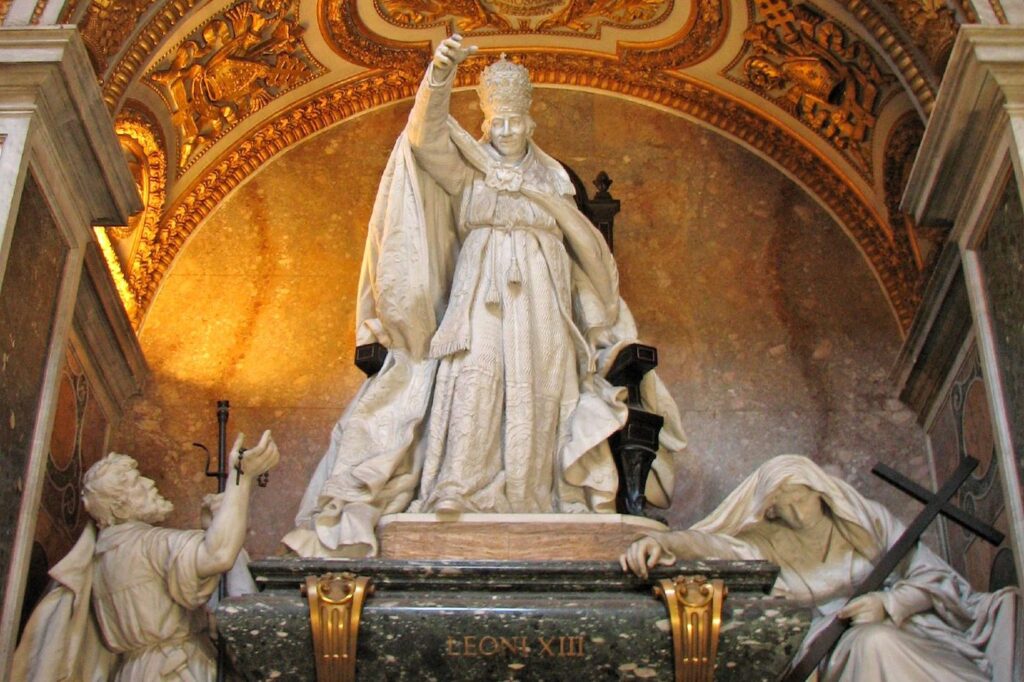Some integralist Catholics on the American Right look to Leo XIII for magisterial backing in their condemnations of the American experiment and the “liberalism” they argue undergirds it. Leo’s teachings on liberalism and the relationship of the Catholic Church to the state appear most prominently in his encyclical, Immortale Dei. Generally speaking, integralists tend to argue that Leo provides magisterial teaching on the proper relationship of the Church to the state. Leo suggests that the state must cooperate with the Church in order to enable individual human persons to reach their true End, Heaven. Under the Church’s direction, the state must curtail liberties most associated with “liberalism”: religious, economic, and political freedom.
This is a plausible reading of Leo’s writings on politics and the Church. But it universalizes his teachings beyond the confessionally Catholic states of Europe that existed in Leo’s day, and thereby ignores the development of Catholic social teaching since his time. This reading also fails to take into account the advent of pluralism that Vatican II came to recognize in the Church’s statement on freedom of religion, Dignitatis Humanae. Indeed, it’s critical to look at what Leo XIII actually said, examine his writings as a whole, and especially to consider the context of his writings before judging their applicability beyond the late nineteenth century.
Liberalism and the Legacy of Rerum Novarum
Most Catholics know little about Pope Leo XIII beyond his 1891 encyclical Rerum Novarum (or “On the Condition of Labor”). This encyclical provides crucial context to Leo’s arguments about liberalism in Immortale Dei (which I will address later) and, studied alongside it, provides a fuller picture of Leo’s political teachings.
Start your day with Public Discourse
Sign up and get our daily essays sent straight to your inbox.Rerum Novarum helped launch modern Catholic social doctrine by addressing pressing questions about labor, private property, and justice. Leo’s main concern is reflected in the encyclical’s title: the physical, mental, and spiritual well-being of workers. The massive scale of industrialization had left workers feeling alienated, impoverished, and victims of unjust wages. Leo’s concern was with justice for all citizens, particularly but not only the poor. Explaining that “the right of private property must be held sacred,” Leo connected property ownership to the need for just wages and promoted not policies but the principles of subsidiarity, charity, and recognition of the dignity of the human person. He counseled that it was precisely to protect the poor that the state must, in justice, ensure that all “private property . . . remain inviolate.” He condemned state socialism as inherently unjust, inhumane, more likely to hurt the “working man” than the wealthy, and rooted in the sin of envy.
Forty years later Pope Pius XI celebrated Rerum Novarum in Quadragesimo Anno (or “In the Fortieth Year”), which further developed the principle of subsidiarity. Pope John XXIII, thirty years after that, linked economic growth and human dignity in Mater et Magistra by arguing that in a just society economic growth will promote human dignity. Most importantly, Pope John Paul II in 1991 issued Centesimus Annus, which followed the collapse of communism and Soviet control in eastern Europe and the dissolution of the Soviet Union itself. “Marxism had promised to uproot the need for God from the human heart,” wrote John Paul II, “but the results have shown that it is not possible to succeed in this without throwing the heart into turmoil.” John Paul argued that democracy and free enterprise, which find their roots in subsidiarity, encourage solidarity, another core principle of Catholic social doctrine.
These encyclicals not only develop Catholic social doctrine, but also address particular questions within their historical contexts. And as they address the specific problems of their eras, they are guided by John Paul II called “fundamental principles.” The questions of 1891 were not the same as those of 1991. Neither was the condition of labor or capital the same. While Leo XIII recognized the dangers that state socialism posed to the individual human person and to society, he was mostly confined to theorizing about fundamental principles and socialism because at the time the world had yet to experience a successful communist revolution.
The illiberal, bloody history of communist states in the twentieth century, however, proved just how astute Leo had been about the soul-deadening and immoral nature of collectivism. In other words, the long twilight and then seemingly sudden demise of Soviet-backed communism between 1989 and 1991 proved Leo XIII right. The Church in reflecting on the rise and fall of communism and the benefits of free enterprise came to a new appreciation of democracy and a more nuanced understanding of liberalism or, rather, liberalisms. The Church emerged much more hesitant to wholly condemn anything merely for being remotely “liberal.” It turns out that not all democracy is like that of the French Revolution; not all liberalism is unhinged from virtue and moral norms; and a free economy is anthropologically sound and therefore more conducive to human dignity and flourishing than a state-controlled one. Democracy and freedom, John Paul II said in Centesimus Annus, come as a package.
Leo connected property ownership to the need for just wages and promoted not policies but the principles of subsidiarity, charity, and recognition of the dignity of the human person.
Beyond Rerum Novarum
Leo’s other encyclicals offer additional clarity about his views of liberty, liberalism, and the role of the state in human society. Those who condemn American liberalism often generously quote Leo’s critiques, but they miss that liberalism’s values such as human rights, freedom, and human dignity comport with Catholic social teaching as Leo presents it. Studying Leo’s other encyclicals suggests the pope had more nuanced views on these themes than liberalism’s detractors might suggest.
In 1888, three years before the release of Rerum Novarum, Leo XIII promulgated Libertas, or, “On the Nature of Human Liberty.” “Liberty,” wrote Leo XIII, is “the highest of natural endowments.” Its exercise figures prominently in human dignity because liberty can be used to reach “the highest good and the greatest evil alike.” Moreover, man is free “to obey his reason, to seek moral good.” The highest good for which he was made is to know, love, and serve God. So why, Leo wonders, is the Church accused of opposing liberty? Because, according to Leo, the Church’s critics “pervert the very idea of freedom” or, worse yet, “extend it at their pleasure to many things in respect of which man cannot rightly be regarded as free.” In other words, like everything else, one’s liberty can be put at the service of good or evil.
The Catholic understanding of sin, vice, and virtue has long been clear: these are properties of the will, not of the intellect. One can know right from wrong and still do wrong. Choice matters. There is, however, an important connection between will and intellect: it turns out that knowledge matters, too. Therefore morally reasonable people should attain the knowledge necessary to exercise human liberty properly. All choices are also moral choices, which means they involve judgment, reason, and knowledge about what is good. Without knowledge, according to Leo, “the freedom of our will would be our ruin.”
Those who condemn American liberalism often generously quote Leo’s critiques, but they miss that liberalism’s values such as human rights, freedom, and human dignity comport with Catholic social teaching as Leo presents it.
If reason is how individuals come to know moral truth attain their good, then laws—guided by the natural law—help direct societies and citizens toward their good. To demonstrate this truth, Leo XIII cites law as a “guide of man’s actions.” Reasonably, we conclude, there must be law and order. Natural law confirms this and is “written and engraved in the mind of every man, and this is nothing but our reason, commanding us to do right and forbidding sin.” This is the same as eternal law, according to Leo—all of God’s creatures are inclined toward their proper end, the ultimate purpose for which they were created. And so, “what reason and natural law do for individuals, that human law, promulgated for their good, does for the citizens of States.”
To make these arguments even clearer, Leo XIII draws heavily from St. Augustine: “There is nothing just and lawful in that temporal law, unless what men have gathered from this eternal law.” Augustine continues, explaining that if “something be sanctioned out of conformity with the principles of right reason, and consequently hurtful to the commonwealth, such an enactment can have no binding force of law, as being no rule of justice.” Here, Leo enjoins believers to civil disobedience of bad laws. Real liberty, concludes Leo, is experienced when we “live according to law and right reason,” if we live under just laws. This freedom to do what we ought to do is “true liberty.”
Leo’s writings on liberty suggest that laws discordant with right reason, and that are corrosive to human freedom rightly understood, are unjust and therefore not real laws. Here, he provides a much clearer principle by which to evaluate politics than any wholesale condemnations of liberalism do.
Which Liberalism?
In his earlier encyclical, Immortale Dei, Leo does urge that “in a free State, unless justice be generally cultivated, unless the people be repeatedly and diligently urged to observe the precepts and laws of the Gospel, liberty itself may be pernicious.” This warning captures integralists’ concern about liberty going awry in liberal societies, which is an understandable and legitimate worry. But note that when Leo says people must be “urged to observe the precepts and laws of the Gospel,” he does not appoint the state to do the urging; this is, first and foremost, the Church’s responsibility. The lack of an established church in liberal regimes therefore should not be seen as a failure.
After surveying Leo’s other writings, it becomes apparent what kind of “liberalism” Leo does condemn: the liberationist project of rationalist philosophers who make reason that is independent of natural, divine, and eternal law the supreme judge of truth. He wrote in Libertas: “These followers of liberalism deny the existence of any divine authority to which obedience is due, and proclaim that every man is the law unto himself.” This is an ethical system that masquerades “under the guise of liberty” and that substitutes license for true liberty. These liberals understand true freedom to be defined not “in any principle external to man, or superior to him, but simply in the free will of individuals.” The result is “that the authority in the State comes from the people only. . . . Hence the doctrine of the supremacy of the greatest number, and that all right and all duty reside in the majority.” Any liberalism that sees individual will as the ultimate authority, therefore, should be vehemently rejected. But of course, not every version of liberalism does this.
Leo XIII was operating in the context of the late nineteenth century, as “a prisoner of the Vatican.” He was thinking and writing amid the growing social question surrounding industrialization, socialism, and secularization in Europe. Context matters. Real events matter. Leo XIII even says this in Libertas—the Church must sometimes hold its nose and cooperate with states, to the benefit of the Church and the citizens.
To determine which arguments transcend time and which ones are context-driven, we must take historical events, disputes, and doctrinal developments seriously. Doing so helps us see how these factors shape and reshape usage and definition of terms like “liberalism.” The English Catholic historian Christopher Dawson was right when he said of “liberalism” that “there is no word—not even democracy—that has been used so loosely to cover such a variety of divergent elements.”














